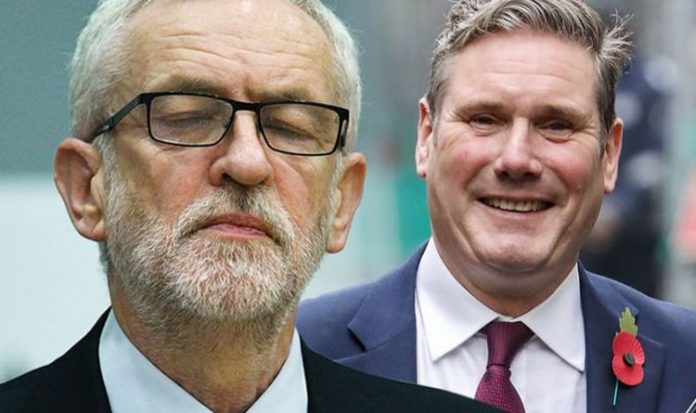It is nearly two weeks since Sir Keir kicked Mr Corbyn out of the Labour Party. The suspension came after the publication of the Equality and Human Rights Commission (EHRC) report on antisemitism under Mr Corbyn’s leadership. It divulged serious misgivings and a lack of action in addressing the issue.
Mr Corbyn reacted to the report by branding antisemitism a “cancer”, yet simultaneously appeared to evade responsibility, claiming “the scale of the problem was also dramatically overstated for political reasons by our opponents inside and outside the party, as well as by much of the media”.
Furore broke out, with Sir Keir taking immediate action over the comment, telling reporters: “If – after all the pain, all the grief, and all the evidence in this report – there are still those who think there’s no problem with antisemitism in the Labour Party, that it’s all exaggerated, or a factional attack, then, frankly, you are part of the problem too – and you should be nowhere near the Labour Party either.”
Yet, just days after the statement, Sir Keir appeared to indicate that Mr Corbyn could be allowed back into the party should he “reflect” on his words.
Tim Bale, Professor of Politics at Queen Mary University, told Express.co.uk that it is a move Sir Keir could use to prove he has taken complete power of the party – although one that risks turning the public against him.
He explained: “I think the impact on public opinion will be something Starmer will have to worry about should he let Corbyn come back.
“To some extent, he’s shown his own and the party’s new power in suspending the former leader, but having him back would no doubt be interpreted as weakness by the likes of the Conservatives and will worry some in the Jewish community that he wasn’t taking antisemitism as seriously as they thought he would.
“Having said that, it will all depend on the terms of Corbyn’s readmission: if he were only readmitted on the basis that he gave a grovelling apology and distanced himself from his remarks, then I think that would probably be seen as a success for Starmer and solidify him as a leader.”
Sir Keir has faced stern opposition to suspending Mr Corbyn.
JUST IN: Labour civil war: Left ‘poised to leave party in disgust’
In the days following the suspension, he said that “the vast majority of people in the Labour Party and the wider Labour movement think that that was the wrong response, and that the right response was to honestly accept the findings, apologise and move forward”.
Mr Corbyn has already said he plans to fight the decision.
In an interview a day later, Mr Corbyn called for calm and for members to “make the case” for left-wing values internally.
Anger was furthered after a Channel 4 interview with Sir Keir appeared to reveal that Mr Corbyn had heard the news from a photographer.
Sir Keir insisted that he “didn’t know how Jeremy Corbyn found out” yet proceeded to claim that a letter had been sent to him to inform him of his suspension.
Mr Corbyn’s constituents were also angered by the move.
A handful who spoke to The Guardian late last month said the former leader “didn’t deserve” the treatment he had received.
One person said: “Corbyn is a very nice man and very popular here. I’ve known him for a long time and he is always helping poor people. He doesn’t have the arrogance of the other politicians.”
Mr Corbyn has a decades-long career as an anti-racist campaigner, having fiercely protested Apartheid in South Africa.







